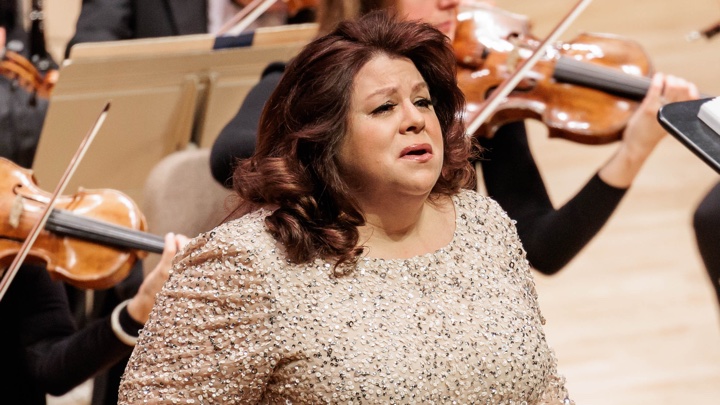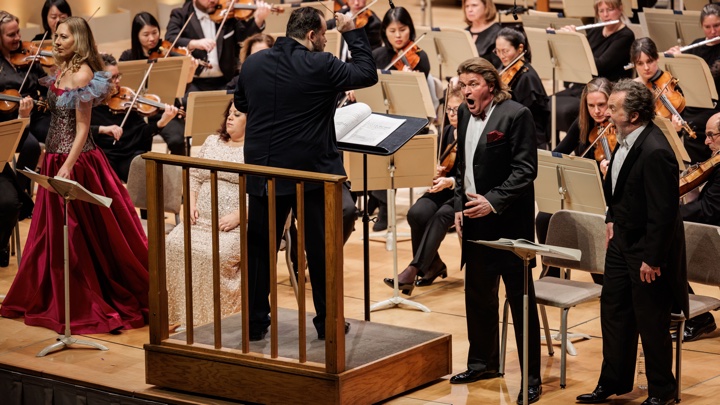

Klaus Florian Vogt played this moment wonderfully on Saturday evening at Symphony Hall where the Boston Symphony Orchestra performed excerpts of Tannhäuser. Sternly crossing his arms to read out the Pope’s edict, his signature light and hyper-focused sound was sharply delivered with a holy fury whereas the rest of the monologue was pitched with wide-eyed mania. He channeled strength without sacrificing his base tone and the sudden tide-change of Tannhäuser’s perception of himself had a bracing immediacy and musical clarity.
Yet Andris Nelsons seems to view the entire opera as representative of this switch, this diametric ambivalence between sexy Venus’s profane and virginal Elisabeth’s sacred. And while the orchestra played with sweeping unity, the polar shifts highlighted in Wagner’s oft-nebulous opera left me slightly seasick.
This was maybe most obvious in the first half of the program—what had originally been billed as the “Venusberg music” (which, to me, implied from the overture to the end of the Venusberg scene) turned out to mean only the overture and Bacchanale of the 1875 Vienna version, an over-repetitive setting of the introductory music that overstays its welcome and lacks the concise combination of languor and fleetness characteristic of its other iterations.
The strings played with distinguished detail, but the incessant jerking between mellow, gloomy reeds and basses and bright and skittish brass and high strings that characterizes this edition failed to justify its use over the others, even if Nelsons does know how to bring the orchestra to a delicious final diminuendo.
Maybe part of the problem was that the program felt so off-balance and the excerpts, an overlong overture followed by Act III of the opera, felt especially random (indeed, any performance that only gives the slinky, copper-voiced Marina Prudenskaya only three minutes to make an impression as Venus is already missing an opportunity). Yet the arrival of vocalists gave the evening an added lift, even if Nelsons’s approach to the material was seldom pointed towards the stratosphere.
The big story of these performances was the return of Amber Wagner for the first time since what was rumored to have been withdrawal from the stage in 2020 (in fact a pause to focus on family matters with the intention to resume a full performance schedule post-Covid, per her new management last year.) Despite a handful of recent performances on the West Coast and in Cincinnati, she has not performed on the East Coast since Il tabarro at the Met in 2018.
And thank God she’s back—with that rich, rounded sound and an intrinsic sob in her voice, it’s an instrument that must be heard. In Elisabeth’s prayer, she swelled the voice, which lacks a register break at least up until to G-flat, the aria’s highest note, to meet the orchestra with clean, even force and free, resonant high notes. Only some occasionally choppy breathing towards the end of the aria could distract from the power of her sound.
But the clear joy in musicmaking wasn’t limited to her singing—parked onstage for the entirety of the act, it was lovely to watch her listening to her colleagues sing. She smiled, bobbed her head with the music, and even occasionally wiped away tears. I sincerely hope to see her back onstage sometime soon; her passion elevated the entire evening.
Christian Gerhaher met his usual high standard; the polished teak of his voice is wielded with such delicacy (he plays it like a cello) that you forget he can scale his sound from a whisper to a roar with startling dexterity, as he did in his recognition of Tannhäuser following an unusually sweet hymn to the evening star.
The chorus, under James Burton, was exceptionally gentle with the men’s pilgrim chorus landing with precision and gravitas. Nelsons’s shepherding of the opera’s final moments brought the evening to a magisterial close and showed that, as is often the case with Wagner, the whole is incontrovertibly greater than the sum of its parts.
The prevailing ambiguity of Nelsons’s approach to the score might be credited to an off night—during the bows, in what must be every conductor’s worst nightmare, he slipped off the podium and fell onto the stage to a briefly stunned and silent audience (he soon got up, seemingly uninjured).
Or it might be credited to the choice of excerpts not really affording a feel for the breadth of the opera’s music. Regardless, it offered occasion for some high-quality soloists (both vocally and in the orchestra—Jessica Zhou on harp and Thomas Rolfs on trumpet were standouts) to briefly shine like Wolfram’s evening star, an evening star that will hopefully lead the BSO back to full operas that better give the composers, and the singers, their dues.
Photos: Aram Boghosian



























Comments